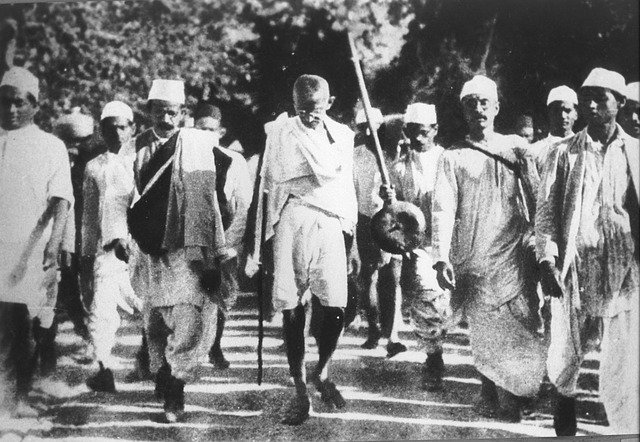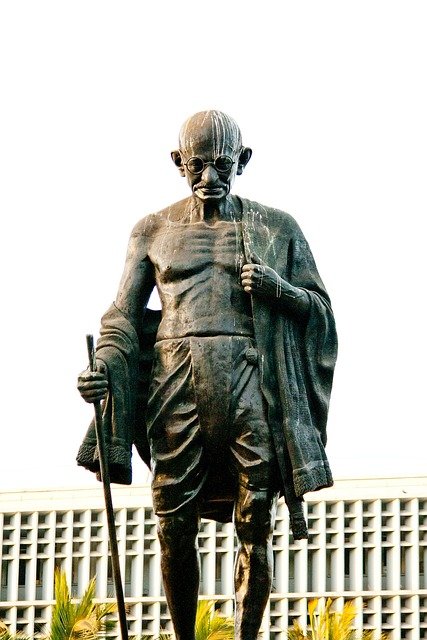Understanding Gandhi as an "Atypical" Ascetic (Part 2)
Part 2: Research on Gandhi's early life as a Hindu and how it fits the role of my definition of an ascetic. An interesting read for those wanting to know some of the internal struggles Gandhi faced as a child and young adult.
For those that missed Part 1 (my introduction) see link below:
https://steemit.com/religion/@tfeldman/understanding-gandhi-as-an-atypical-ascetic-part-1
(however, if you are short on time I think Part 2 can be read without Part I and stands by itself. My main thesis in Part 1 explores the definition of a religious ascetic and how I define Gandhi as an "atypical ascetic."
Mahatma Gandhi: The Atypical Ascetic
Part 2: Seeing Gandhi as Traditional and Ascetic in the First Part of His Life
Before exploring why Mahatma Gandhi is an “atypical” ascetic, it is first necessary to establish that he is, indeed, an ascetic.
There are many components of his early years that psychologically illustrate that he had true commitment to his family duty as a Hindu. His duties to his family also coincided with ideologies on how to live and think, which can be seen in the sense of this paper as ascetic.
Gandhi was born in Porbandar, India in 1869 to a Hindu family. They were of the Vaishya caste, which is the merchant and artisan level of Indian society. His family was also of the Bania community, which traditionally valued strict vegetarianism (Gandhi 3). His family arranged him to be married at the age of 13, which deeply troubled Gandhi later in life, but since he did not complain with the proposition, it shows his commitment to his family traditions.
Gandhi seemed to be very honest and claims that he never lied while attending school in India (Gandhi 6). What is very shocking from his autobiography is how heavy his conscience tended to be on errors he would make. He claimed to have stolen from his brother once, and he also for a period of time chose to eat meat when a Muslim friend convinced him (Gandhi 22, 27).
From these few examples, one can see that Gandhi has a conscience that is much more morally bound than an “ordinary” person. When he stole from his brother, he felt so ashamed that he gave a written admittance of the theft to his father (Gandhi 27). The tears his father shed on his deathbed while reading this confession can be perceived in many ways. It appears that Gandhi felt that his father was acting in a form of ahsima, nonviolence, which Gandhi later perceived as one of the most virtuous principles. Although honesty can be seen as an important characteristic for any son to have with his father, it seems specifically important in the Bania caste.
His father’s tears might also express the father’s gratitude that his son remained dutiful to his family. There are countless other examples throughout Gandhi’s early life that can be seen as undertones to his ascetic nature and continued faith to family traditions, but two main ones of great importance are conceptions of sex and dietary needs.
The first major ascetic characteristic that separated Gandhi from most people in his culture was the severity of his hatred for the lustful side of his nature. The first “test” of his will came when he was having a sexual encounter with his wife at the exact moment of his father’s death. When this happened, he declared
“All was over!...if animal passion had not blinded me, I should have been spared the torture of separation from my father” (Gandhi 30).
He was deeply torn that his carnal-flesh desires had blinded him from truth. He also had a clear sense of regret for not being together with his father at the moment of death. One might believe that any individual can feel this regret, but that fact that it is centered on his sexual impulses is a very ascetic tendency. His wife also delivered a child just after the incident who only survived for three days. Gandhi felt this was a curse or a form of karma that men needed to be careful about (Gandhi 31). The pain that Gandhi felt after this incidence also demonstrates a religious concern, which reflects his traditional culture as well.
His perception of guilt in failing to control his desires and abandoning his duties reflects a true ascetic nature. This type of nature strives for self-renunciation in order to find “Truth” and act in the traditional way. The psychological disgust for lust is present in many ascetic communities. John Cassian, a Christian monk who wrote conferences for monastery members, declares
“For it is one thing to be abstinent… and another to be chaste" (Cassian 154).
Cassian’s conferences dealt a lot with not only refraining from sex, but also, to refrain from lustful thoughts. This is a very ascetic ideal in many religions such as Christianity and Hinduism. Even though Gandhi was not at the abstinent point yet, he yearned for it in a spiritual sense. He knew that he had carnal desires, but even at an early age, he had regret. Although he did not begin abstinence until 1906, it was also dutiful that he did not. At the time of his father’s death, he still had the Hindu role of “student” and “”householder” to complete. The ascetic path was prolonged due to traditional roles he had to play.
Another ascetic and traditional ideal was Gandhi’s strict adherence to vegetarianism. One might think that this was normal for a Hindu of the Bania caste, which it was, but his life story has to be put into context. After his father’s death, his mother made him promise not to have sex or eat meat in England, where he went to study law. The weather conditions on his ship voyage to England were very horrific, and many people asked him to eat meat (Gandhi 43). His mother was not there to see if he violated his vows, but he kept them anyway. This appears to be ascetic because he kept with traditional duties by keeping his vow, while also denying his physical needs in the midst of the malnutrition he would receive without eating the meat. His diet in general seemed very limited and simple (beyond vegetarianism as if gluttony appeared to be another desire that he wished to stop).
He discusses how he only lived on food and bread alone for a period of time (Gandhi 56). His belief went beyond his vow and religious necessities. At an early age, his life was shaping to be one of simplification. It can be inferred that this simplification would help suppress desires of the flesh.
Sex and dietary considerations both help support the notion that Gandhi was bound to duty with Hindu religious undertones. It is rather hard to separate duty and religion in this culture. It might be true that ascetic values are embedded in the Bania tradition, but Gandhi’s psychological perceptions are very extreme even in his early years.
END OF PART 2
*All works cited listed in Part I from link above
*All photos are from pixabay.com


Part II goes into how Ghandi was an ascetic, but his values that make him ascetic also differ from the typical path of an ascetic because he chose to stay within society, not leave it.
Interesting articles, Gandhi's vow to his mother while he was in London also included abstaining from alcohol. But it appears that was something that never tempted him.
Are there links for parts 3 and 4?
Thanks for reading and appreciate the feedback! Yes, it has been quite some time since I did this research but there were many examples of abstinence. Alcohol was one. He felt a deep sense of need to shut out the instant gratifications. His early life was much more traditional than the later years. His life history is fascinating